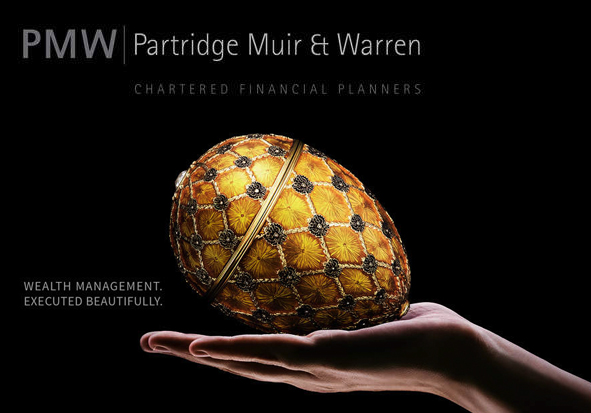FINANCE
Surrey’s Premier Lifestyle Magazine
Technology isn’t always on your side
Simon Lewis, CEO at Partridge Muir & Warren, explains that technology can be an extremely useful tool in modern society, but advises caution and consideration before giving complete trust to anything it can offer.
PHOTO COPYRIGHT: TWINSTER PHOTO

Most of us are probably guilty of typing our symptoms into an internet search engine to find out what might be wrong with us. Why do we instinctively feel that what is served up, which often includes a myriad of ‘sponsored’ links to potential remedies, is of any real value? It takes 10 years of training to become a fully qualified general practitioner in the UK, so how can we fool ourselves that 20 minutes on Google will give us an insight into what might be wrong with us?
It is human nature to want to have some power over our lives so the misapprehension that technology will provide us with such power is seductive. The reality of course is that far from guaranteeing that we are all better informed, technology makes it easier for those who control it to influence our views and behaviour; and our best interests are often not well served. We are all in danger of acting with unconscious incompetence.
What has all of this got to do with financial planning and investment? Well, just like the example above, technology has enabled convenient and apparently credible solutions to help everyone to plan their finances and manage their investments. These solutions have become popular and incredibly lucrative for those that own them, but they are not without their pitfalls for those who use them.
A timely reminder of how investors can be taken for a ride is provided by the sorry tale of Woodford’s investment funds, that have trapped billions of pounds of investors’ money with no clear end in sight. At least not one that doesn’t involve the permanent destruction of a big chunk of their hard-earned savings. Although others are also guilty, the online investment platform Hargreaves Lansdown (HL) was by far the largest promoter of Woodford funds, which attracted well over £10 billion of investors money.
The platform provides access to thousands of funds, but most investors are herded towards a narrow list of funds, referred to as the ‘Wealth 50’. To quote from HL’s website, “The Wealth 50 is a shortlist of our experts’ favourite funds. We’ve spent decades and thousands of hours crunching the numbers, and meeting fund managers, to uncover funds we believe have the most potential in each sector. To date, we’ve had an enviable track record.”
It is human nature to want to have some power over our lives so the misapprehension that technology will provide us with such power is seductive. The reality of course is that far from guaranteeing that we are all better informed, technology makes it easier for those who control it to influence our views and behaviour; and our best interests are often not well served. We are all in danger of acting with unconscious incompetence.
What has all of this got to do with financial planning and investment? Well, just like the example above, technology has enabled convenient and apparently credible solutions to help everyone to plan their finances and manage their investments. These solutions have become popular and incredibly lucrative for those that own them, but they are not without their pitfalls for those who use them.
A timely reminder of how investors can be taken for a ride is provided by the sorry tale of Woodford’s investment funds, that have trapped billions of pounds of investors’ money with no clear end in sight. At least not one that doesn’t involve the permanent destruction of a big chunk of their hard-earned savings. Although others are also guilty, the online investment platform Hargreaves Lansdown (HL) was by far the largest promoter of Woodford funds, which attracted well over £10 billion of investors money.
The platform provides access to thousands of funds, but most investors are herded towards a narrow list of funds, referred to as the ‘Wealth 50’. To quote from HL’s website, “The Wealth 50 is a shortlist of our experts’ favourite funds. We’ve spent decades and thousands of hours crunching the numbers, and meeting fund managers, to uncover funds we believe have the most potential in each sector. To date, we’ve had an enviable track record.”
Really? Woodford’s investment strategy was causing eyebrows to be raised throughout the investment management sector a long time ago. We spotted the warning signs early last year and methodically pulled our clients out by the year end. We identified that Woodford’s funds were following an increasingly risky investment approach by allocating an escalating proportion of their funds to shares in companies that were not listed on the stock market. Although the objective was to enhance returns, there was a corresponding acceptance that risk for the investors would be increased.
Whilst there is nothing wrong with making long term investments, they have no place in an open-ended investment fund. This is because such funds must be able to meet redemption requests and therefore need to be able to easily dispose of the investments that have been made. Investments in companies that are not stock market listed are not liquid. They are also more difficult to value.
We took this change in approach as a sign of overconfidence because the manager assumed that new money from investors would keep flowing in and did not legislate for a reversal of this trend. Overconfidence is not something that we tolerate when allocating our clients’ money to investments. Sadly, when investment stories end sourly it is usually because those managing the money have lost sight of whose money it really is.
HL also has some explaining to do because, whilst Woodford’s flagship fund remained on the ‘Wealth 50’ until its suspension, HL had been quietly pulling out its own money for some months before. It is an inescapable truth that it’s easier to get your own money out when you are cheerleading others to put it in. I would hope that this issue will be on the agenda for the regulatory investigation that is now underway.
You might think I am indulging in schadenfreude, but I’m not. I’m angry, firstly because novice investors have been unwittingly steered into a high risk fund and also, because events like this taint everyone involved in investment management.
We should all embrace technology because it can make our lives more productive and enjoyable. But we should not allow our appreciation of these benefits to let technology conceal the fact that service providers want something from us, and we all need to be vigilant to understand exactly what this is and make a conscious decision that we are happy with it.
And let’s not forget that, whilst technology evolves quickly, human nature hasn’t really changed in thousands of years. There will always be ‘snake oil salesman’ peddling a solution for your problems or needs and technology lets them in through your front door. Be on your guard…
Whilst there is nothing wrong with making long term investments, they have no place in an open-ended investment fund. This is because such funds must be able to meet redemption requests and therefore need to be able to easily dispose of the investments that have been made. Investments in companies that are not stock market listed are not liquid. They are also more difficult to value.
We took this change in approach as a sign of overconfidence because the manager assumed that new money from investors would keep flowing in and did not legislate for a reversal of this trend. Overconfidence is not something that we tolerate when allocating our clients’ money to investments. Sadly, when investment stories end sourly it is usually because those managing the money have lost sight of whose money it really is.
HL also has some explaining to do because, whilst Woodford’s flagship fund remained on the ‘Wealth 50’ until its suspension, HL had been quietly pulling out its own money for some months before. It is an inescapable truth that it’s easier to get your own money out when you are cheerleading others to put it in. I would hope that this issue will be on the agenda for the regulatory investigation that is now underway.
You might think I am indulging in schadenfreude, but I’m not. I’m angry, firstly because novice investors have been unwittingly steered into a high risk fund and also, because events like this taint everyone involved in investment management.
We should all embrace technology because it can make our lives more productive and enjoyable. But we should not allow our appreciation of these benefits to let technology conceal the fact that service providers want something from us, and we all need to be vigilant to understand exactly what this is and make a conscious decision that we are happy with it.
And let’s not forget that, whilst technology evolves quickly, human nature hasn’t really changed in thousands of years. There will always be ‘snake oil salesman’ peddling a solution for your problems or needs and technology lets them in through your front door. Be on your guard…
essence info
Simon Lewis is writing on behalf of Partridge Muir & Warren Ltd (PMW), Chartered Financial Planners, based in Esher. The Company has specialised in providing wealth management solutions to private clients for 50 years and was recently voted Wealth Manager of the Year: Southern England at the City of London Wealth Management Awards 2019. Simon is an independent financial adviser, chartered financial planner and chartered fellow of the Chartered Institute for Securities and Investment. The opinions outlined in this article are those of the writer and should not be construed as individual advice. To find out more about financial advice and investment options please contact Simon at Partridge Muir & Warren Ltd. Partridge Muir & Warren Ltd is authorised and regulated by the Financial Conduct Authority.Telephone: 01372 471 550
Email: simon.lewis@pmw.co.uk
If you would like to receive similar articles by email please visit: www.pmw.co.uk
“A timely reminder of how investors can be taken for a ride is provided by the sorry tale of Woodford’s investment funds.”
